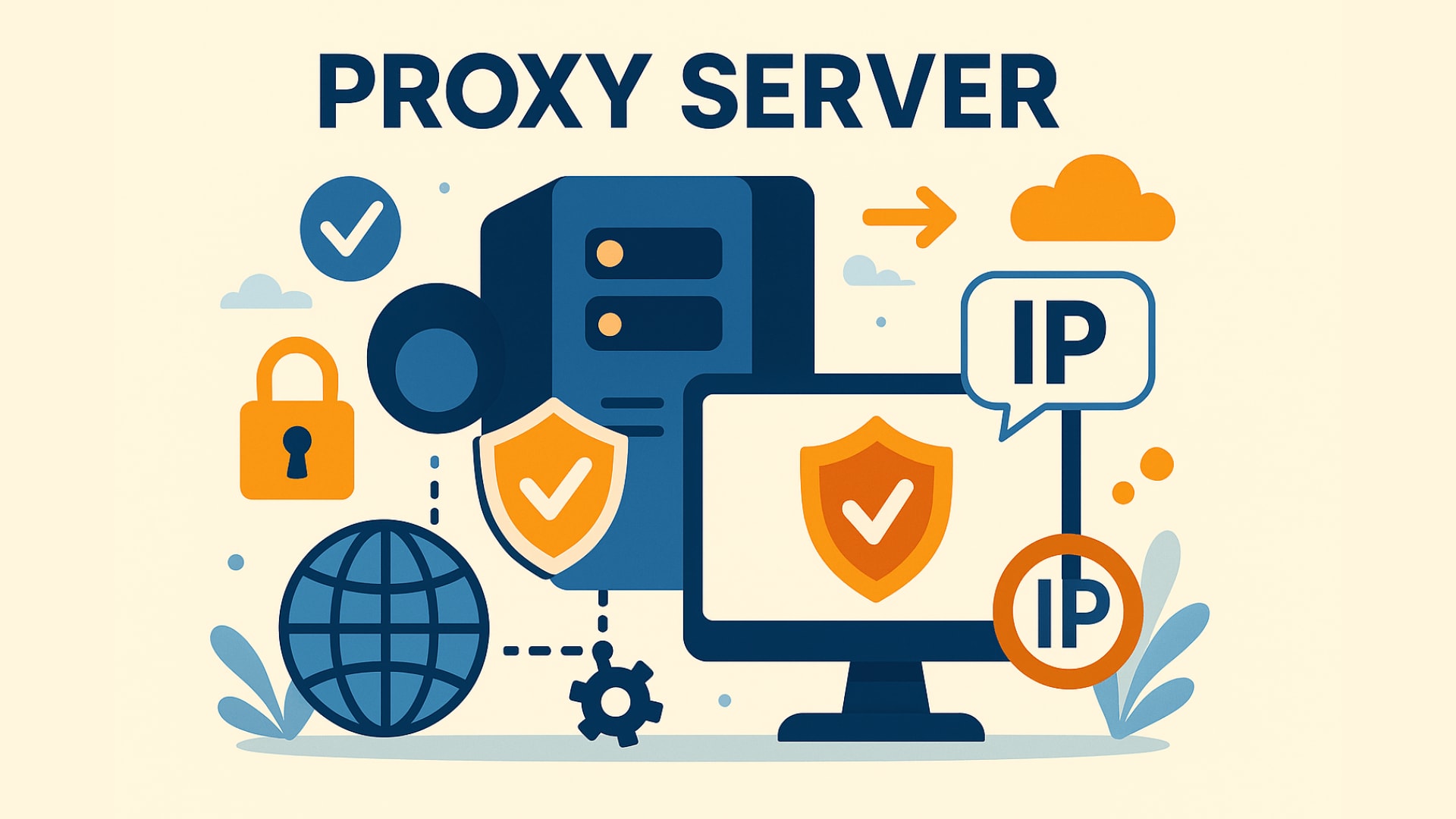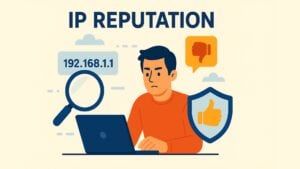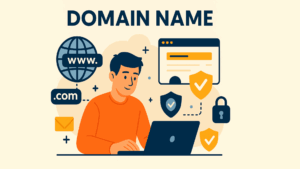
A proxy server might sound like a technical concept reserved for IT professionals, but it’s a powerful tool that affects anyone using the internet — especially businesses. As cyber threats grow more sophisticated and privacy concerns intensify, understanding what a proxy server is and how it fits into your digital defense strategy becomes essential. Whether you’re looking to boost security, manage internet usage, or filter out unwanted traffic, proxy servers can make a big difference.
Table of contents
What Is a Proxy Server?
A proxy server acts as a middleman between your device and the internet. When you try to access a website, your request first goes through the proxy. The proxy evaluates the request, potentially alters or filters it, and then forwards it to the intended destination using its own IP address. When the response comes back, it returns through the proxy before reaching your device.
This process might seem simple, but it’s powerful. Because the proxy uses its own IP address, it effectively hides your actual location and identity from the websites you access. For businesses, this adds a layer of privacy, control and security that’s increasingly important in today’s digital landscape.
How Do Proxy Servers Work in Practice?
Imagine visiting a library and asking the librarian to fetch a book on your behalf. You never directly contact the shelves yourself. The librarian — your proxy — knows the system, retrieves what you need, and brings it to you. A proxy server does much the same online.
When your browser makes a request, the proxy intercepts it. It may check if a cached version of the content exists locally to speed things up. If not, it forwards the request to the website server. The server replies, and the proxy again reviews the response before delivering it to you.
This process not only keeps the user’s identity shielded but also enables content filtering, traffic logging and performance optimization along the way.
Why Businesses Use Proxy Servers
Proxy servers play several roles in a business environment, far beyond simply anonymizing browsing. They enhance security by shielding internal networks from direct contact with the internet, making it harder for hackers to pinpoint vulnerable endpoints. Companies also use proxies to monitor and control internet access internally, ensuring that employees aren’t misusing time or company bandwidth on inappropriate websites.
They help optimize network performance through caching. If many employees access the same site frequently, a proxy can store a local copy, significantly reducing load times and internet traffic. This function is particularly valuable in larger organizations or during high-traffic periods.
Moreover, proxies are invaluable for accessing geo-restricted content. By appearing to browse from another location, businesses can perform market research or competitor analysis more freely. Proxies also assist with load balancing by distributing requests across multiple servers to avoid bottlenecks and system overloads.
Understanding the Risks of Proxies
Despite their many advantages, proxy servers come with their own set of challenges and risks. Not all proxies are created equal. Free or poorly maintained proxies might not encrypt your traffic, leaving data vulnerable to interception. Some may log your activity or inject ads into the content you’re viewing. Businesses must vet proxy services carefully and opt for trusted providers that prioritize privacy and security.
Another issue is that proxies can slow down your connection, especially if they are overburdened or configured improperly. While caching can help speed up content delivery, heavy or poorly managed proxies might do the opposite. Moreover, some websites actively block traffic from known proxy IP addresses, which can interfere with legitimate business activities like research or automation.
Types of Proxies
There isn’t just one kind of proxy server. Each type serves a different purpose and offers distinct features. A forward proxy is the most common, typically used to manage outgoing traffic and apply content filtering or usage policies within a private network. A reverse proxy, by contrast, manages incoming traffic and often sits in front of web servers to distribute load, enhance performance, and protect sensitive infrastructure.
Transparent proxies are often used without users being aware — commonly by ISPs or organizations for monitoring and control. While they pass along your IP, they still route traffic through an intermediary. Anonymous proxies, as the name suggests, hide your IP address but may still indicate that you’re using a proxy. For complete privacy, high anonymity proxies go a step further by obscuring both your identity and the presence of the proxy itself.
Choosing the right proxy depends on your goals — whether you prioritize security, speed, privacy or control.
Role of Proxies in Cybersecurity
In today’s threat landscape, proxy servers are vital components of a layered cybersecurity approach. They help detect and filter malicious traffic before it reaches internal systems, mitigating risks like malware distribution, phishing attacks and DDoS attempts.
They also provide businesses with granular visibility into traffic patterns, enabling better detection of anomalies or unauthorized activities. This is crucial for preventing insider threats and maintaining compliance with data protection regulations.
In environments where uptime is critical, reverse proxies also act as load balancers, ensuring that no single server is overwhelmed and that users always experience a fast, reliable connection. This resilience is key for public-facing platforms and services.
Proxies, Bots, and CAPTCHA Systems
There’s an important intersection between proxy usage and CAPTCHA systems. Many bots use proxy networks to mask their identities, rotate IP addresses and bypass detection. This is particularly relevant for activities like credential stuffing, fake registrations, and scraping — all of which abuse online forms and services.
To combat this, CAPTCHA solutions assess signals like IP behavior, request patterns and behavioral data. While some systems rely heavily on IP analysis — which can mistakenly penalize legitimate proxy users — advanced solutions like captcha.eu use cryptographic proof-of-work and anonymized behavior analytics to detect abuse with higher accuracy and fairness. This ensures that businesses can block bad bots without disrupting legitimate traffic — even if it’s coming through a proxy.
Conclusion
Proxy servers are powerful, flexible tools that serve a wide range of purposes — from enhancing privacy to fortifying cybersecurity and optimizing performance. For businesses, they are indispensable in navigating today’s digital challenges safely and efficiently.
However, to get the most out of proxies, they must be integrated thoughtfully, with attention to performance, compliance, and user experience. Paired with intelligent bot protection tools, like captcha.eu, they can form a robust barrier against automated threats while supporting privacy-first principles.
Whether you’re securing your infrastructure, managing employee internet use, or preventing bot-based abuse on your website, proxy servers — when used wisely — can be an invaluable part of your digital toolkit.
FAQ – Frequently Asked Questions
What is a proxy server in simple terms?
A proxy server is a system that acts as a gateway between your device and the internet. It processes your web requests on your behalf, masking your IP address and helping manage traffic, privacy, and security.
How does a proxy improve cybersecurity?
By acting as a middleman, a proxy can block harmful traffic, prevent direct access to your internal network, and filter content. It also provides anonymization, which protects your identity from external threats.
Are proxy servers the same as VPNs?
Not exactly. While both hide your IP address, VPNs encrypt all your internet traffic, providing more privacy. Proxies typically only reroute specific types of traffic and may or may not offer encryption.
Can proxies prevent bots from attacking my website?
Not directly, but they help identify suspicious traffic patterns that can aid in detection. For active bot mitigation, proxies are best combined with CAPTCHA solutions like captcha.eu that can distinguish between human users and bots.
What types of proxy servers are there?
Common types include forward proxies (for outgoing traffic control), reverse proxies (for server protection and load balancing), transparent proxies (often used for monitoring), and high-anonymity proxies (for maximum privacy).
100 free requests
You have the opportunity to test and try our product with 100 free requests.
If you have any questions
Contact us
Our support team is available to assist you.




